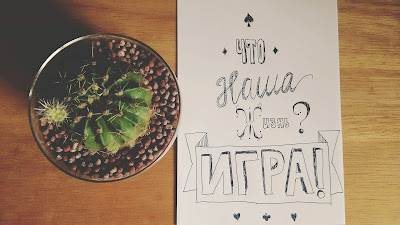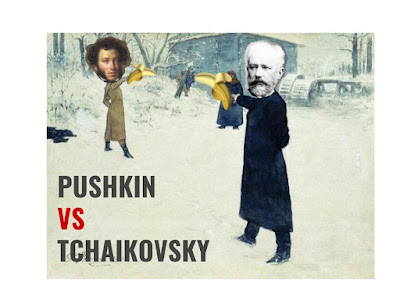Is there a secret magic number hidden in the 'Queen of Spades'?
Taking a closer look into Tchaikovsky's penultimate opera and the original short story by Pushkin that inspired it.
♠ ♠ ♠
When Hermann, the central figure featuring in
Alexander Pushkin’s story of the Queen of
Spades, finds out that the three
cards: three, seven and ace were
(supposedly) going to win him a fortune, everything around him started to
resemble threes, sevens and aces and they even started to appear in
his dreams:
Seeing a young girl, he’d say: “How slender is she!.. A true Three of Hearts”. When asked “what’s the time?”, he’d answer: “five minutes to seven”. Every pot-bellied man would remind him of an ace.[1]
While learning my third opera by Tchaikovsky - the
Queen of Spades (first Eugene Onegin,
followed by Iolanta), I started to
notice how this opera was gradually taking over my brain similarly to how the
three cards eventually possessed Herman. I also noticed how there are threes
everywhere in both the opera and in the story. Whether this is just my
confirmation bias noticing every instance of such coincidences or they are
intentionally there, I can’t ignore them. So I made a list of all the threes
that I found because I like making lists (occasionally I found some sevens, too).
Alexander Pushkin’s Queen of Spades:
♠ The Queen
of Spades was written in 1833
♠ Hermann hears the story of the Old Countess and
how she knows the secret of the three winning
cards (Chapter 1)
♠ Hermann finds out the three secret cards from
the Old Countess’ apparition. The first two cards win. The third card loses - instead of ace, it turns out to be the Queen of
Spades
♠ The word ace in Russian - туз (tuz),
which was supposed to be the third
winning card, contains three letters
♠ The Old Countess sitting in front of her mirror
is surrounded by three girls
(Chapter 2)
♠ The Countess’ grandson Tomsky spills the beans
when he accidentally tells the Countess that her old acquaintance Princess
Dar’ya Petrovna, whose death has been kept a secret from the Countess, has been
dead for seven years (Chapter 2)
♠ When the Countess rings the bell with all her
might, three girls rush in through
the door (Chapter 2)
♠ A girl brings Liza a note from Hermann three days after the day when Liza
threw a letter to Hermann out of her window for him to catch (Chapter 3)
♠ At the ball, the conversation between Lizaveta
Ivanovna and Tomsky is interrupted by three
girls approaching the latter (Chapter 4)
♠ "I think he has at least three crimes on his conscience" says Tomsky to Lizaveta Ivanovna about Hermann (Chapter 4)
♠ "I think he has at least three crimes on his conscience" says Tomsky to Lizaveta Ivanovna about Hermann (Chapter 4)
♠ Three
days after the fateful evening when the Countess passed away, Hermann goes to
her burial service at the monastery (Chapter 5)
♠ When the Countess’ ghost ‘reveals’ to Hermann
the three winning cards, she also tells him three things:
1. Not to bet more than one card per night
2. Afterwards never play another game for the
rest of his life
3. That she will forgive him for her death if
he marries Lizaveta Ivanovna
♠ Hermann goes crazy and ends up in room no. 17 (ace + seven) of the
Obukhov Hospital (Conclusion)
Pyotr Ilych Tchaikovsky’s Queen of Spades:
♠ The orchestral introduction contains three musical themes that appear later
in the opera -
1. From Tomsky’s Ballade where he tells the
story of the Old Countess and her three cards
2. The main leitmotif of the opera which is
associated with the Old Countess/three cards
3. Herman’s love theme where he declares his
love for Liza
♠ The Countess’ leitmotif consists of three groups of three notes - two shorter notes and one longer note.
♠ When Chekalinsky describes Herman a strange one
for only watching card games and never actually playing himself, Surin adds:
“It’s as if he has at least three crimes on
his heart” (Act I, Scene 1, No.2)
♠ In Tomsky’s Ballade (Act I, Scene 1, No.5) where we
tells the story of the Old Countess, we come across repetitions in groups of threes:
●
О боже! О боже! О боже (Oh God! Oh God!
Oh God)
●
Графиня, Графиня! Графиня (Countess,
Countess! Countess)
●
О карты, о карты, о карты! (Oh cards, oh
cards, oh cards!)
●
Три
карты, три карты, три карты (three cards, three cards, three cards)
♠ According to Tomsky’s story, a ghost appeared
and warned the Countess that she shall receive a fatal blow from the third passionate lover who will demand
with force to find out the three winning cards
♠ Herman promises 1. thunder 2. lightning 3. wind that Liza shall be his or he shall die (Act I, Scene 1, No.6)
♠ In Act I Scene 1 Finale, Herman calls Liza (three times):
1. красавица
krasavitsa - a beauty
2. богиня
boginya - a goddess
3. ангел
angel - an angel
♠ In Act II, Scene 4, No.17, Liza calls Herman:
1. чудовище chudovishsche - a monster
2. убийца ubiitsa
- a murderer
3. изверг izverg
- a fiend
♠ Tchaikovsky adds a new character - Prince
Yeletsky - who is supposed to marry Liza. This creates rivalry for Herman,
resulting in a love triangle. Or
perhaps the love triangle actually consists of:
1. Herman
2. Liza
3. The three cards?
♠ The opera is divided into three acts, and the third
act contains three scenes. You’re
probably thinking, so what? Many operas are written in three acts! But three acts - seven scenes - in one opera (3, 7, ace?) seems too much of a coincidence to ignore, no? Furthermore, a similar succession to the three cards: win
- win - lose, can be found in the story. In Act I, Herman wins Liza’s
heart; In Act II the Shepherd and Shepherdess unite in a happy ending in the
Pastorale; in Act III - Herman loses three things:
1. Liza
2. all his money
3. his own life
© vegan conductor
[1] Chapter 6. Увидев молодую девушку, он говорил: “Как она стройна!..Настоящая тройка червонная”. У него спрашивали: “который час”, он отвечал : “без пяти минут семерка”. Всякий пузастый мужчина напоминал ему туза.


